SD Mayor Gloria Continues to Avoid 101 Ash St & Secret Police Funding Issues

[This article is part of our in-depth coverage of two continuing stories in San Diego. Follow links at the bottom of this page to read our previous articles on these topics]
By Arturo Castañares
Editor-at-Large
San Diego Mayor Todd Gloria continues to ignore questions about two thorny issues facing the City despite repeated requests for comments and numerous opportunities to address the growing scandals.
The two major issues were absent from the State of the City address Gloria delivered last month where he discussed his vision for tackling the concerns he says are important to all San Diegans.
Although Mayor Gloria touted his focus on environmental issues, police reform, homelessness, COVID-19, and regional transportation, among others, he did not mention the City’s pending issues related to its $128 million purchase of the 101 Ash Street building or a secret committee run by City staff that allocated over $200 million to local police without following state public disclosure laws.
The issues seem unrelated but the common thread that ties them together is that Todd Gloria voted to support both during his eight years on the City Council and now, as Mayor, will have to deal with resolving the two high-profile controversies along with several other difficult and expensive problems facing the City.
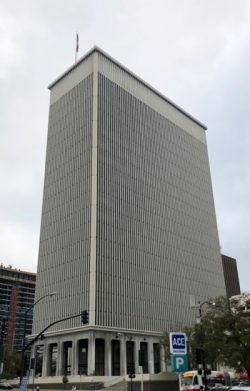
Expensive Building Sits Empty
During his prepared speech, Gloria ignored the huge financial debacle related to the 20-year, lease-to-own agreement he championed in 2016 when he was on the City Council for a building that now sits vacant nearly a year after the County Air Pollution Control District shut it down over dangerous levels of asbestos exposure.
The building, located across the street from City Hall and known by its address as 101 Ash St., has become mired in lawsuits amid accusations of incompetence by City staff and political decisions influenced by campaign considerations.
In August 2020, local attorneys Michael Aguirre and Lawrence Shea sued the City, the building sellers, landlord, and lenders to stop the monthly lease payments, claiming the transaction represented a waste of public funds because taxpayers are not receiving any benefit, or use, of the building.
City Attorney Mara Elliott later filed her own lawsuit against the financiers to force them to give the City an abatement, or holiday, from making payments while the building is being repaired and made usable as the City intended.


Then, last month, Aguirre and Shea amended their lawsuit to claim that the transaction is unconstitutional and therefore should be completely voided. The lawsuit details the poor condition of the building when the City executed the lease/purchase, including outdated and non-working air conditioning, heating, fire, and electrical systems, and exposed asbestos that was toxic to anyone entering the building.
Repair estimates to deal with the cancerous asbestos and upgrades to building systems exceed $110 million.
All this leaves the City without a new home for over 1,100 employees who had planned to move out of dilapidated offices in other buildings, and also continuing to pay rent in those other spaces even after making more than $23 million in lease payments on 101 Ash St.
As La Prensa San Diego has previously reported, the City may also have an issue with Jason Hughes, the City’s real estate broker consultant who worked closely with Faulconer, City staff, and the landlord to negotiate the 101 Ash deal.


Hughes was appointed as a pro bono “Special Assistant for Real Estate Services to the City of San Diego” in 2013 by then-Mayor Bob Filner. Hughes was to help the City negotiate better lease deals on various buildings, including a new lease in 2013 that was estimated to have saved the City $2.8 million in the first year.
Filner was accused a sexual harassment a few months later and resigned from office in August 2013. During the time between Filner’s resignation and the installation of a new mayor in a special election in March 2020, then-City Council President Todd Gloria served as Interim Mayor.
During the seven months Gloria filled in as Mayor, Jason Hughes continued to represent the City in various deals, including starting the negotiations for the City to purchase the Civic Center Plaza building within the City Hall complex at 3rd and C Streets.
City emails reveal that Hughes began negotiating on the City’s behalf to purchase the Civic Center Plaza (CCP) building in November 2013, just after Gloria began serving as Interim Mayor, and continued after Kevin Faulconer took office in March 2014.
Hughes negotiated the terms of the deal with Cisterra Development, a local company that agreed to serve as middleman to buy the building and lease it to the City under a 20-year, lease-to-own transaction. Under the lease deal approved in January 2015, the City agreed to pay $160 million in rent, operating expenses, and improvements over the term of the lease. Then-Councilman Gloria voted for the deal.
The following year, Hughes was involved in negotiating the purchase of 101 Ash. With Hughes’ help, the City signed a letter of intent again with Cisterra that would allow the City to either buy the building directly or lease the building much like the CCP deal the year before. Emails released by the City show Hughes was directly involved in negotiating the terms of the agreement, and also met with City staff and Mayor Faulconer about the deal.

The deal was approved by City Attorney Mara Elliott despite onerous language that gave the sellers and landlord complete immunity from liability for all known and unknown conditions of the building. The City agreed to be on the hook for all costs for a building that was already nearly 50 years old and, as the City later found out, was in desperate need of repairs and modernization.
In both the CCP and 101 Ash deals, Cisterra simply borrowed against the value of the City’s long-term lease payments to secure financing for the building transactions. Cisterra could not have closed the financing based on the value of the buildings alone without the City’s signed leases.
After the 101 Ash building was closed down by the county last year, investigations into the City’s process in executing the lease deal were launched. Two people close to the transaction claimed that Hughes had been paid by Cisterra, hinting that Hughes may have violated his fiduciary duty to the City and also conflict-of-interest laws that protect against self-dealing.
Under California Government Code Section 1090, elected officials and staff are restricted from participating in a public contract in which they have a financial interest. The restriction also applies to outside experts, including lawyers and brokers, who negotiate contracts or advise elected officials on approving them. The entire deal is void and all financial transactions would have to be unwound if anyone restricted by Section 1090 participated in the public contract.
It appears that Hughes also failed to file any annual Form 700 Economic Interest disclosure forms with the City that require listing any financial conflicts he may have had that would be inconsistent with his representation, unless a department head determined that he was exempt from such reporting. The City of San Diego has no record of any 700 forms from Hughes or whether any department director made a determination that Hughes did not have to file financial disclosure forms.
According to state requirements, consultants are required to file disclosures when they participate in making a governmental decision if they “negotiate”, “advises or makes recommendations”, conducts “research or making any investigation”, and/or provide “any report, analysis, or opinion, orally, or in writing” which require the exercise of judgment in his field of expertise related to a decision before a government agency.
Licensed real estate brokers in California are also restricted from receiving fees from opposing parties unless they have a signed dual agency agreement signed by both parties. City officials say no such agreement exists with Hughes.
La Prensa San Diego reached out to Hughes for comment several times starting in September 2020 through emails, phone messages, and contacts with his personal assistant, as well as emailing his wife, Shay Hughes, who serves as President, COO, and owner of Hughes Marino, for comment on behalf of the company.
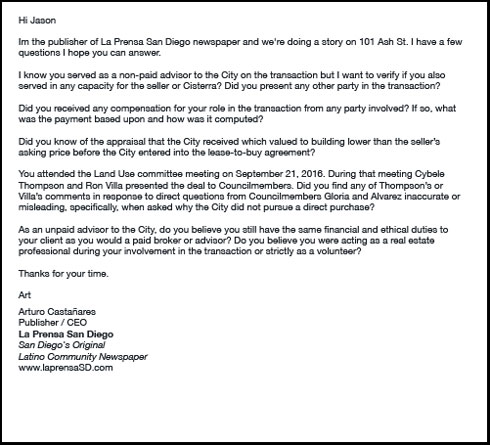
No responses were received for months until last week when Hughes emailed La Prensa San Diego stating that the “last article was defamatory and not accurate in a number of ways. Just because I don’t want to comment doesn’t mean any of your speculation is true.” Hughes, however, did not demand a correction or retraction to any LPSD story.
When asked again last week to clarify if he received any compensation on either the CCP or 101 Ash deals, Hughes responded that “you can be absolutely sure that I would not participate in any transaction without making all the requisite disclosures,” but he did not answer whether or not he was paid. Hughes did not specify what disclosures, if any, he made or to whom he made such disclosures. No further responses were received from Hughes.
The California Department of Real Estate has opened an investigation into whether Hughes received payment from Cisterra. That investigation is still pending.
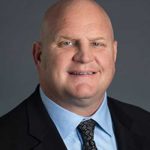
Jason R. Wood, principal of Cisterra, did not respond to a request for comment to confirm if his company made any payments to Hughes on either the 101 Ash St. or CCP lease deals with the City. Cisterra has also refused to provide an accounting of who received proceeds from the $91.8 million in financing they received toward the building purchase. Documents show Cisterra paid $74,440,000 to Shapery and Manchester for the building and applied $5 million toward tenant improvements, by Cisterra still has not disclosed how the remaining $14.36 million in the deal was split up, even though the City’s Charter requires full disclosure of all parties who directly or indirectly receive benefits in a City contract.
In March 2002, before the 101 Ash deal became headline news, Cisterra was announced as a partner in the San Diego Padres plan to build-out the City-owned Tailgate Park lots near Petco Park. But by the time the City made the decision in September 2020 on which group would develop the four-block area in the East Village, Cisterra was embroiled in the 101 Ash debacle and was quietly removed from the team’s Tailgate Park announcements without any official word on whether the company remained part of the project.
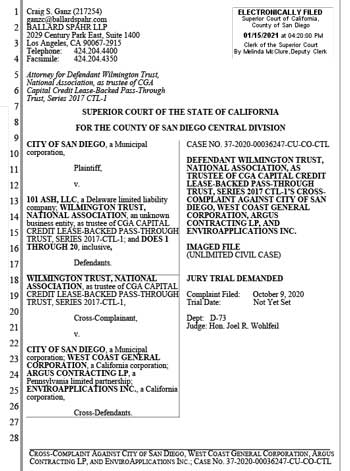
On January 15th, Wilmington Trust, the company that represents the bond holders which financed the building purchase, counter-sued the City demanding payment for past and ongoing rents under the lease terms, claiming that the City caused any disruption of use of the building through its own unapproved construction and that the City had full knowledge of the condition of the building, including asbestos, before it agreed to the lease deal.
No clear solution to the legal and financial issues related to 101 Ash has been articulated by the City since Mayor Gloria took office in December.
The City could still be liable for over $100 million in repairs needed before the building can be occupied, or the City may be involved in lawsuits for years to determine who is responsible for repairs or if the deal is invalided by the courts.
Given the uncertain political and financial ramifications of 101 Ash St., many political observers thought it was odd that the Mayor would ignore such a significant issue in the annual State of the City address.
Secret Police Funding Exposed, Lawsuit Filed

A secret committee that spent over $200 million in San Diego County to buy military gear and surveillance technologies was only a secret to the public because it appears that nearly every law enforcement agency in the county and many political leaders knew about and requested funds from the group.
The funding is supposed to be used to prepare for and respond to terrorism attacks, but most of the equipment purchased is used daily by San Diego County police agencies, including facial recognition cameras, license plate readers, riot gear, and armored assault vehicles. No terrorists attacks have occurred in San Diego since the funding grants began in 2004.
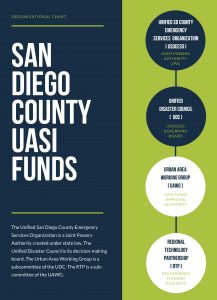
As La Prensa San Diego first reported on December 16, 2020, the Urban Area Working Group (UAWG) is a committee under the Unified San Diego County Emergency Services Organization, a county Joint Powers Authority agency comprised of representatives from the County and all 18 cities in the region. UAWG distribute federal Urban Area Security Initiative (UASI) funds to police and fire agencies throughout the county each year.
But UAWG is managed by San Diego city staff under the San Diego Police Department, and the City of San Diego is the agent that first receives the federal funds from the US Department of Homeland Security. In order to receive the funds, the City Council votes each year to accept the funds.
Since 2004, the City of San Diego has received over $265 million in annual federal funding allocations that each went before the City Council.
During his eight years on the Council between 2008 and 2016, Gloria voted seven times to receive the money, even though staff did not provide the Council with any specific items to be purchased. The Council’s votes gave UAWG the authorization to allocate the funds without further Council review or public input. None of the Councilmembers, including Gloria, asked for details to be provided back to the Council after the secret committee made its final allocations.
In 2013, while serving as Interim Mayor, Gloria approved the annual resolution on behalf of the City to accept that year’s allocation of $16,873,461.
UWAG held its own secret meetings each year to decide which agencies would receive funding for their individual requests. SDPD not only runs the program, but is also a recipient agency. UAWG has held its meetings in secret without public notices since 2004. No information about San Diego’s UAWG is available on the Internet or on the City’s website.

La Prensa San Diego first became aware of the existence of the UAWG funding being distributed to local agencies in April 2020 when the El Cajon City Council approved a Memorandum of Understanding (MOU) with the City of San Diego’s Office of Homeland Security to accept over $400,000 in UASI funds. Although the agenda item did not provide specific information on the funding request, the City of El Cajon had requested funding to purchase a LENCO Bearcat armored assault vehicle. The agenda item was not discussed in public during the Council meeting.

Based on that information, La Prensa San Diego submitted numerous public records requests and inquiries to multiple local agencies to follow the funding process from request to funding. LDSP found that the Port District’s Harbor Police also requested and received UAWG funding for its own LENCO Bearcat armored vehicle through a similarly vague agenda item. Neither of the two purchases for armored vehicles were openly disclosed at any public meeting.
Public agencies, including committees of JPAs, are required to hold public meetings under the state law known as the Brown Act.
California’s Ralph M. Brown Act, passed in 1953, is one of the state’s “sunshine” laws. It requires government entities to conduct their business at open and public meetings, with very limited exceptions. The Brown Act’s main objective is that the people must be informed so they can keep control over their government.
The Brown Act requires public notices of meetings at least 72 hours beforehand, with action items listed on its agenda to give the public and stakeholders opportunities to comment, support, and/or object to items under consideration. Meetings held in violation of the Brown Act may be illegal and therefore null and void, and any actions taken at those meetings could be rescinded.
After months of requests, officials involved in UAWG meetings still refused to disclose meeting schedules and information on upcoming project approvals.
The City of San Diego’s Program Manager who oversees the UAWG meetings did not respond in December to La Prensa San Diego’s request for information on any upcoming UAWG meetings. A few days later, LPSD learned that a meeting was imminent, but no specific information was made available by the City as to the date and time of the meeting.
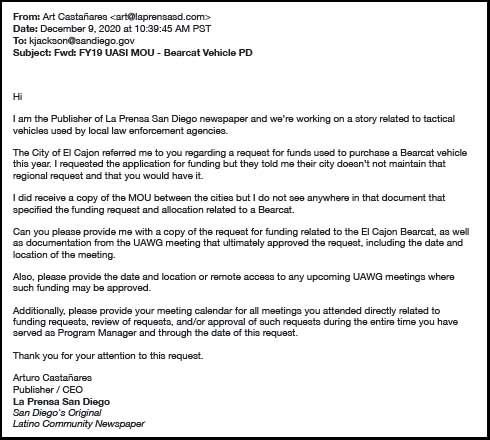
Late on December 15th, La Prensa San Diego filed a lawsuit against the County JPA under the provisions of the Brown Act that allows preemptive lawsuits to challenge public agencies that continue to violate open meetings laws. The following morning, members of UAWG were informed of the lawsuit.
Emails later released under a Public Records Act request show that a UAWG meeting had been scheduled for 1:00 p.m. on December 16, but was cancelled just minutes before it began after staff reviewed La Prensa San Diego’s lawsuit. City staff had not provided any public notice for the meeting.
On February 1, 2021, the County JPA responded to LPSD’s lawsuit and, although they admit UAWG is a “legislative body” under state law and therefore required to follow the Brown Act, the lawyers argue the lawsuit is “not ripe” because they cancelled the secret meeting in December before it started. The County did not file a demurrer or a motion to dismiss the lawsuit so LDSP will move forward with subpoenas for documents and depositions of key individuals connected with UAWG. LPSD is seeking the release of all documents and information held by UAWG related to all past purchases that have not been disclosed to the public.
Although the City is not a party to the lawsuit, City staff have stopped responding to requests for comment.
La Prensa San Diego has sent eight emails to Jen LeBron, Gloria’s Director of Communications, since December 18th in an effort to provide Gloria with adequate time to comment for the story. To date, no comments have been received. [Read entire email chain]
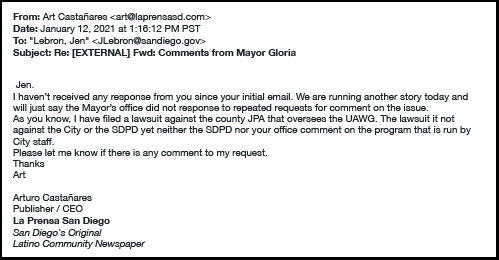
The San Diego Police Department’s Public Information Officer told La Prensa San Diego that he has been advised by “legal counsel” not to provide any comments.
A request to interview San Diego Police Chief Nisleit for this story has not be answered.
New Mayor, Same MO: Deafening Silence
Kevin Faulconer spent seven years as the chief executive of San Diego’s government, yet he remained tight-lipped about 101 Ash and the secret police funding through the end of his time in office in December when Gloria was sworn-in.

Faulconer himself toured the building in 2015 just days after “Papa” Doug Manchester invested $20 million to become a 49% owner along with majority owner Sandy Shapery. Manchester had been one of Faulconer’s biggest campaign contributors and, more importantly, an early backer who helped anoint Faulconer as the Republican candidate to run in a special election to replace Bob Filner. Faulconer was chosen over Carl DeMaio who had lost to Filner the previous year’s election for Mayor.
Faulconer was sensitive to the political optics of having the City pay Manchester directly in the purchase of 101 Ash, as Faulconer told senior staff in a meeting in his office on September 6, 2016. La Prensa San Diego was the first to report that, according to several people in the meeting, the then-Mayor directed staff to pursue a lease instead of a purchase so Cisterra would buy the building from Manchester and Shapery, giving Faulconer one degree of separation from his large benefactor. (Voice of San Diego has also reporting on this meeting here and here)
Faulconer’s official calendar shows that he met with Manchester on October 7, 2016, just 10 days before the full City Council voted to approve the agreement that would result in Manchester selling the building to the City and cashing out $25 million.
More than three years later, when issues with 101 Ash became known in early 2020, Faulconer called for independent investigations to examine the transaction. By July 2020, three outside reports found that the City failed to perform adequate due diligence before buying the building, and one report said the City gave Cisterra a “broker-like role” in the deal. One of the reports found the lease to be legally problematic in that it created a “potential shield for Cisterra and the prior owner against any liability to the city for nondisclosures.”
Critics have argued that more detailed disclosures and inspections would have been required had the City purchased the building through a traditional Purchase & Sale Agreement instead of a lease, but Faulconer closed down that option to distance himself from Manchester.
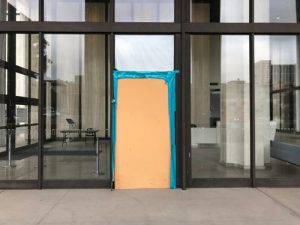
It wasn’t until months after the building had been evacuated that Faulconer stopped the City from making its $545,000 monthly lease payment, but only after the Aguirre/Shea lawsuit was filed seeking to stop the payments. For the rest of the year and until he left office, Faulconer was nearly silent about the debacle as lawsuits began to fly in from multiple directions. The 101 Ash St. building remains closed and empty today.
Faulconer has now announced he is running for Governor either in 2022 or in a special election if Governor Gavin Newsom is recalled before the end of his first term, but 101 Ash St. may become a political liability for Faulconer.
Just last week, another San Diego Republican candidate for Governor, John Cox, launched online commercials bashing Faulconer for his role in the 101 Ash deal using San Diego Union-Tribune quotes criticizing the deal as “irresponsibility”, “an avoidable disaster”, and “a deliberate fraud”. When asked about the ad a few days later on KUSI TV, Faulconer avoided the 101 Ash issue entirely, saying “folks are going to bring up all kinds of untrue allegations and that’s ok“. Faulconer endorsed Cox in his 2018 gubernatorial race against Newsom.
During his nearly two full terms in office, Faulconer was also involved in facilitating the secret UAWG police funding program. Faulconer signed seven resolutions accepting the federal funds and, as strong Mayor, oversaw the operations and administrative staff who managed the program. There is no public record of Faulconer criticizing the secret meetings or the extensive military and surveillance equipment purchased through this secret program during his entire time in office.
Faulconer was careful to avoid two of the City’s biggest pending issues and left them for his successor to handle.
Gloria 1.0 or Faulconer 2.0?
Since Todd Gloria took office on December 10th, he too has remained silent on 101 Ash and, since the first news reporting on the secret police funding committee on December 16th, has ignored that issue, too.
During the campaign for Mayor in 2020, Gloria said little about his role in the 101 Ash deal except after a disputed draft memo supposedly between outside lawyers investigating the building transaction and City Attorney Mara Elliott’s office was leaked to NBC7 news. The memo contained a comment, known as footnote 15, that said the investigators wanted to interview Gloria about his role in approving the deal, but that Elliott’s office refused to allow them access to Gloria.
A dispute erupted between the City Attorney’s office and NBC7 about the authenticity of the memo, and lawyers from the firm who supposedly created it claimed it was fabricated.
Gloria’s campaign then denounced the NBC7 story as being based on a fabricated document, and Gloria attacked his election opponent, Barbara Bry, for having used the news stories against him. NBC7 retracted the portion of the story attributed to the contested memo although no one proved the document was fabricated.
Some legal experts maintain that the footnote could have been in an authentic draft memo circulated among City lawyers but later removed before the final version of the memo was completed. Lawyers explain that a draft version is considered “attorney work product” and technically does not exist for purposes of disclosure, even to clients, and therefore can be disavowed.
But the issue of footnote 15 may still be unresolved.
La Prensa San Diego filed a Public Records Act request in September 2020 requesting “All writings (including emails and email attachments) that contain or include what is commonly known as “footnote 15” in one or more memorandums from Burke, Williams, & Sorenson LLP.”

In response to the request, City Attorney Mara Elliott’s office said that her office “has redacted portions of certain records subject to the attorney-client privilege and/or the attorney work product doctrine, and therefore are not disclosable pursuant to California Government Code section 6254(k).”

Then-Mayor Kevin Faulconer’s office responded to the request by claiming that “certain records have been withheld pursuant to Government Code section 6254 (k) Evidence Code section 950 et seq. [attorney client privilege] per Craig Gustafson, Senior Director of Communications.”
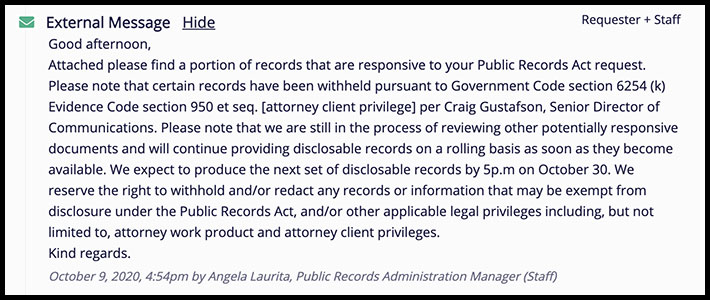
Both of those responses claim to have withheld some documents because of attorney client privilege, attorney work product protections, or under Section 6254(f) as part of “complaints to, or investigations conducted by, or records of intelligence information or security procedures of, the office of the Attorney General and the Department of Justice, the Office of Emergency Services and any state or local police agency.”
The City Attorney’s office and Mayor Kevin Faulconer’s office did not say no documents exist containing or including footnote 15, but instead claimed privileges that would only apply if a document including footnote 15 exists and was created by one of the lawyers working for the City Attorney’s office or its outside lawyers, if such a document was shared with one or more employees of the City, and/or if the documents are part of an ongoing criminal investigation.
Both responses imply footnote 15 does exist and originated from lawyers working for or with the City Attorney’s office. No internal documents have been released by the City in response to LPSD’s Public Records Act request after five months of delays. The City continues to search for documents and extended its next response to February 18.

But regardless of the dispute about the authenticity of footnote 15, Gloria has never addressed the underlying issues raised in the disputed memo:
What did Todd Gloria know about the building deal, and when did he know it?
Gloria toured the building before the deal was drafted, was the most enthusiastic supporter among all Councilmembers, and made the motions to approve the deal both in committee and on the Council floor, yet he has remained virtually silent on the transaction.
To date, no final report from the law firm involved in the contested memo was ever released, and no final conclusions were ever made public. City Attorney Mara Elliott’s office evidently received draft versions of the outside investigators’ report during the investigation, but never published their final conclusions. There has been no reporting as to whether the outside investigators ever interviewed Todd Gloria about his involvement in the deal and, if so, what he said.
No other public reporting of Gloria’s actions in supporting the lease deal have been made public. Gloria himself has admitted he was briefed by City staff before his votes in favor of the agreement, but he has not detailed what information he received in those briefings. He has not disclosed if he met with Jason Hughes, principles of Cisterra, or the sellers.
And Gloria has not responded to questions about what actions, if any, he may have taken since assuming the position of Mayor with respect to broker Jason Hughes. No public documents or comments show that the City has ended its relationship with Hughes.
So far, after more than 60 days in office, Mayor Gloria has avoided both the issue of his role in the 101 Ash deal and how the City will deal with the financial fallout of the building debacle, as well as his eight-year role in supporting the secret disbursement of over $200 million in federal funds that have been used to purchase military equipment and surveillance technology without any public disclosures or hearings and in violation of state law.
Police funding has become a hot political issue in the past two years after several unarmed people died at the hands of police officers, and after protest marches held in response to those killings. In several cities across the country, police responded to protests with riot gear and armored vehicles, prompting calls to “Defund Police” and demands for shifting law enforcement funding toward social services, youth services, housing, education, and healthcare.
The lack of transparency and disclosures in San Diego’s police funding for over 16 years has raised concerns among some local elected official and community leaders just as conversations about policing and criminal justice are taking place.

“Despite law enforcement’s constant opposition to common sense measures that will ensure transparency and accountability in policing, they continue to make the case for community members who have been demanding it. Their policies and practices erode public trust,” Geneviéve Jones-Wright, Executive Director, Community Advocates for Just and Moral Governance (MoGo) said in an interview with La Prensa San Diego.
“As the City of San Diego is poised to go into meet and confer with police leadership regarding two ordinances that will govern the City’s acquisition and use of surveillance technology, I urge our city officials to remember that, according to this newly discovered information, they were misled by SDPD just last week and to strongly push back against the Police Officers Association’s attempts to water the ordinances down for their own selfish purposes,” Jones-Wright told La Prensa in December.
National City Councilman and former Mayor Ron Morrison said he was unaware of UAWG’s process but agreed it is a public agency that should follow the Brown Act.
San Diego City Councilwoman Monica Montgomery Steppe said she will call City staffers who manage UAWG before the Council’s Public Safety Committee she chairs.

“I share the community’s concerns about how our region is curating certain types of equipment, and the lack of transparency around this process,” Montgomery Steppe told La Prensa San Diego during an interview. “In our efforts to build trust between law enforcement and San Diegans, we must be honest and forthcoming about how this funding will be spent. I look forward to a more detailed analysis to be agendized at a future Public Safety and Livable Neighborhoods Committee meeting.”
A meeting of the Council’s Public Safety and Livable Neighborhoods Committee last week was scheduled to hear about the UAWG process from the SDPD’s Office of Homeland Security staff, but the meeting ran too long to hear the item. No schedule has been released for any future committee meeting that may include the program, but Montgomery Steppe’s office says the item will be rescheduled for the Committee’s March meeting.
Other local elected officials from various cities did not return requests for comment or offered off-the record comments as they seek more information on their respective cities’ use of UASI funds. []
Continuing coverage:
101 Ash Street stories |
UAWG Police Funding stories |
[Part 1] SD City’s Story on 101 Ash St. Deal Is Crumbling
|
Local Law Enforcement Agencies Have Spent Over $200 Million
|
[Part 2] Faulconer Wasted $16 Million to Cover for Papa Doug
|
LPSD Filed Lawsuit to Challenge Secret Police Funding
|
[Part 3] Who Actually Approved 101 Ash Deal?September 23, 2020 |
|
Mayor’s Office Denial Over 101 Ash St. Deal Raises More QuestionsOctober 6, 2020 |
|
Lawyers Suing City Over 101 Ash St. Ask that All Documents
|
101 Ash St. Deal Unconstitutional, Demand Return of Over $23M, Amended Lawsuit ClaimsJanuary 1, 2021 |


 Arturo Castañares
Arturo Castañares


